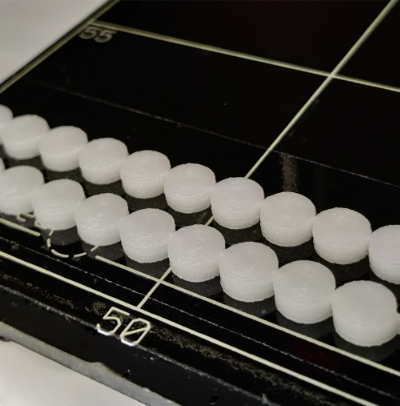Development and bioequivalence of 3D-printed medication at the point-of-care: bridging the gap towards personalized medicine

Personalized medicine is currently hampered by the lack of flexible drug formulations. Especially for pediatric patients, manual compounding of personalized drug formulations by pharmacists is required. 3D printing of medicines, which enables small-scale manufacturing at the point-of-care, can fulfil this unmet clinical need. This study investigates the feasibility of developing a 3D-printed tablet formulation at the point-of-care which complies to quality requirements for clinical practice, including bioequivalence. Development, manufacturing and quality control of the 3D-printed tablets was performed at the manufacturing facility and laboratory of the department of Clinical Pharmacy and Toxicology at Leiden University Medical Center.
Sildenafil was used as a model drug for the tablet formulation. With the 3D-printed tablets a randomized, open-label, 2-period, crossover, single-dose clinical trial to assess bioequivalence was performed in healthy adults. Bioequivalence was established if AUC0-t and Cmax ratios were within the limits of 80.00 – 125.00%. The manufacturing process provided reproducible 3D-printed tablets that adhered to quality control requirements and were consequently used in the clinical trial. The clinical trial was conducted in twelve healthy volunteers. The 90% confidence intervals (CI) of both AUC0-t and Cmax ratios were within bioequivalence limits (AUC0-t 90% CI 87.28 – 104.14; Cmax 90% CI 80.23 – 109.58).
For the first time we demonstrate the development of a 3D-printed tablet formulation at the point-of-care that is bioequivalent to its marketed originator. 3D printing of personalized formulations is a disruptive technology for compounding, bridging the gap towards personalized medicine.
Download the full article as PDF here Development and bioequivalence of 3Dprinted medication at the point of care
or read it here
Development of 3D-printed tablets
Development, manufacturing and quality control of the 3D-printed tablets was performed at the Good Manufacturing Practice (GMP) facility of the Department of Clinical Pharmacy & Toxicology, at Leiden University Medical Center (LUMC ) using quality by design principles. Tablets were printed with a novel, validated, semi-solid extrusion 3D printer from Doser B.V. (Leiden, The Netherlands). The formulation contained Gelucire 48/16 from Gattefossé (Saint-Priest, France) as a carrier, 10% w/w glycerol 99.5% from Duchefa Farma (Haarlem, the Netherlands) as plasticizer, and sildenafil citrate from Spruyt Hillen (IJsselstein, the Netherlands) equal to 10 mg sildenafil per tablet.
Lyousoufi, M., Lafeber, I., Kweekel, D., de Winter, B.C.M., Swen, J.J., Le Brun, P.P.H., Bijleveld-Olierook, E.C.M., van Gelder, T., Guchelaar, H.-J., Moes, D.J.A.R. and Schimmel, K.J.M. (2023), Development and bioequivalence of 3D-printed medication at the point-of-care: bridging the gap towards personalized medicine. Clin Pharmacol Ther. Accepted Author Manuscript. https://doi.org/10.1002/cpt.2870

